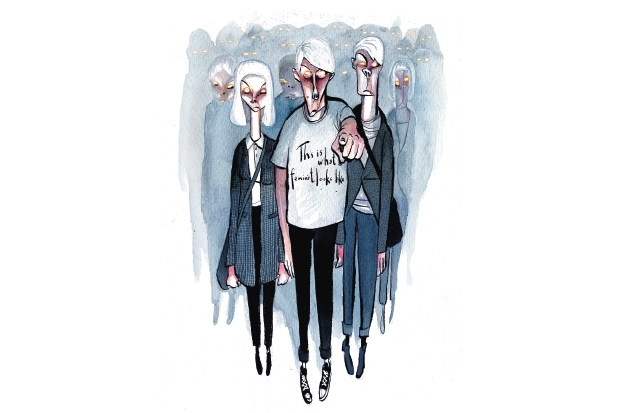A free speech crisis on campus? Apparently, it’s a myth, concocted by right-wing commentators and latched on to by a Tory government desperate to talk about something other than Covid. That, at least, is the unconvincing take being echoed across social media at the moment, as the campus wars erupt once again.
When the government announced this week that it wants to toughen the law around free speech on campus, the National Union of Students dismissed the very premise. ‘There is no evidence of a freedom of expression crisis on campus’, it said. ‘Students’ unions are constantly taking positive steps to help facilitate the thousands of events that take place each year.’
This is the same NUS that maintains a blacklist of organisations (two of which are already illegal) who may not speak at students’ union events, and whom NUS officers are banned from sharing a platform with. Admittedly these are unpleasant groups, but are students not able to decide who can speak at their events and trusted to make up their own minds without anyone being put at ‘risk’ (as the NUS suggests could happen)? With this kind of rhetoric, the NUS has provided cover for the censorious activities of its constituent students’ unions for years.
On the issue of free speech on campus, then, the NUS has about as much credibility as the CCP does on the issue of religious freedom in Xinjiang. Show me someone who says campus censorship is a myth and I’ll show you someone who supports campus censorship. But in the spirit of open debate let’s look at some of these arguments in turn.
If the NUS really believes there is ‘no evidence’ of a campus free-speech crisis, I suggest they tell that to Selina Todd, Felix Ngole, Noah Carl, Carl Benjamin, Linda Bellos, Jenni Murray, Julie Bindel, Amber Rudd and Jordan Peterson — just some of the academics, speakers and students who have been sacked, expelled, no-platformed or physically intimidated on campuses due to their views.
As for the claim that students’ unions in particular are ‘constantly taking positive steps to help facilitate’ free speech on campus, the examples to the contrary are also too numerous to mention. So, for brevity’s sake, let’s focus on one of the most unintentionally hilarious trends in SU censorship of late — the assault on student free-speech societies.
Last year, Sheffield SU labelled the free-speech society a ‘red risk’ and told it to submit its speakers for extra vetting before it had even held an event. In 2015, Manchester SU no-platformed Julie Bindel ahead of her appearance at the free speech and secular society. And in 2017, Lincoln University’s conservative society had its social-media privileges withdrawn after it tweeted about the SU’s poor record on free speech.
Pedants will point out that banned events or speakers account for a tiny proportion of the total hosted on campuses each year. But that’s a meaningless statement. No one is suggesting that geography conferences or visiting mathematics lecturers are all getting the no-platform treatment. The point is that where controversy does arise, students’ unions and universities routinely side with censorship.
Plus there is now plenty of research to back up what we have all seen with our own eyes. In 2018, spiked’s Free Speech University Rankings found that more than half of universities and students’ unions place explicit prohibitions on certain speech and ideas, far beyond what the law requires. At some universities, this included outright bans on materials that could be viewed as critical of transgender theory.
This kind of explicit censorship isn’t even the full picture. There is a climate on campus that demonises dissenters and urges students and academics to self-censor. According to a Policy Exchange report last year, only 54 per cent of academics would feel comfortable sitting next to a known Brexit supporter at lunch, and only 37 per cent would feel comfortable dining with a trans-critical feminist.
Whether or not the government’s plan to tackle all this is a good idea is a separate question. Appointing a ‘Free Speech Champion’ to punish universities and students’ unions that allow censorship to run amok threatens academic autonomy and will do nothing to tackle the broader cultural turn against free speech on campus. A pro-freedom crackdown strikes me as a contradiction in terms.
But for the NUS to claim that free speech on campus is actually in rude health, having spent decades trying to do it in, takes some nerve.







Comments